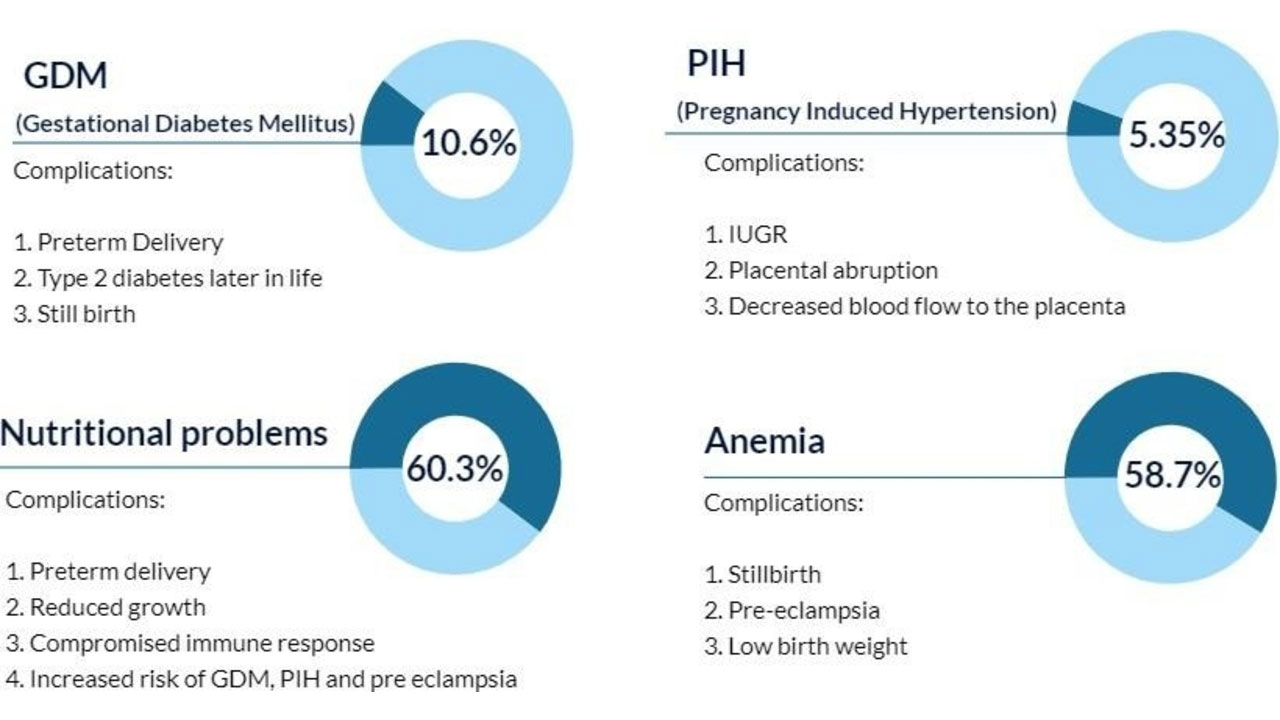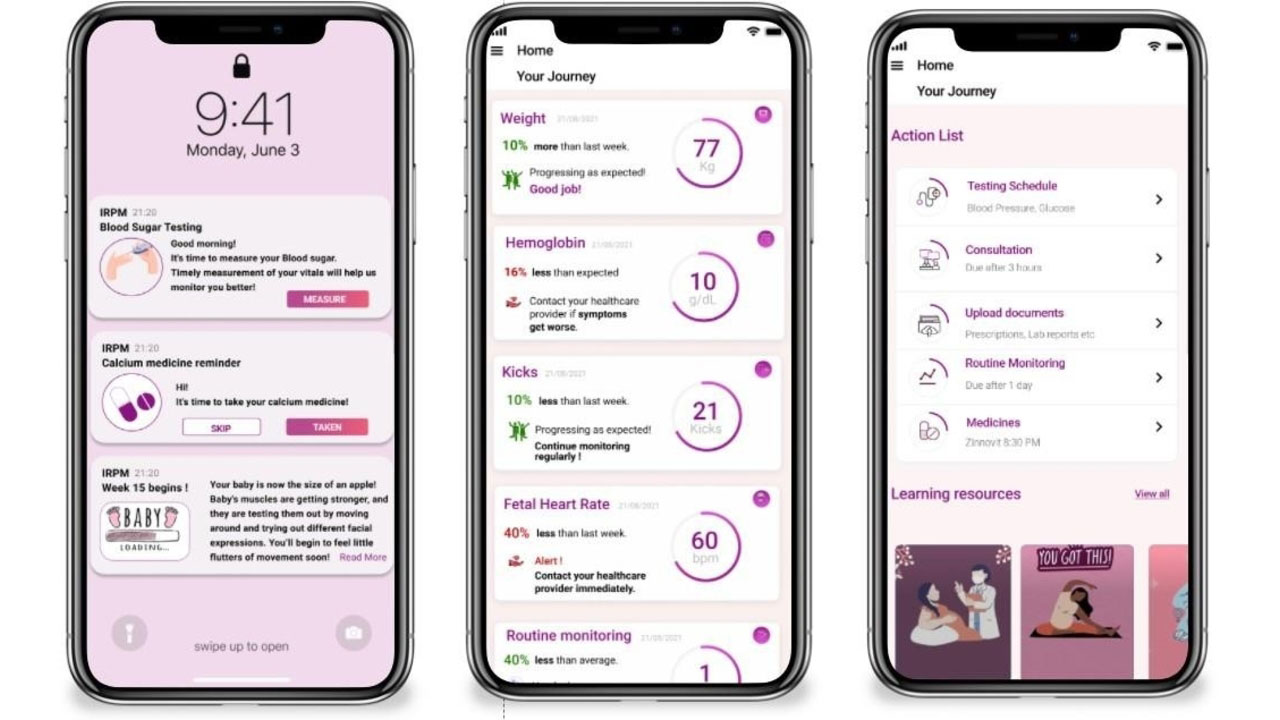Redefining Prenatal Care through Remote Patient Monitoring
Overview
Pregnancy is all about celebration, excitement, change, and some challenges. While the experience is one of the most enriching ones, the medical-centric healthcare model makes mothers feel less connected and vulnerable especially if the pregnancy is associated with additional risk factors.
Leveraging technology like IoT (Internet of Things) and IoMT (Internet of Medical Things), can help reduce this disconnect and empower women to monitor their pregnancy themselves while constantly being connected to their doctors. This will not only ensure timely detection of complications and better insights for the doctors but also make mothers take greater charge of their pregnancy.
Pregnancy and Its Challenges
Source: Maternal Health Learning and Innovation Center
Adding to this, the lack of authentic and relevant information on nutrition, care, delivery, and other aspects of pregnancy makes mothers feel more vulnerable and less involved. This makes them anxious about every little change they experience during their pregnancy. In such instances, the need for a system where a patient can receive constant monitoring and reassurance from their healthcare providers becomes necessary.
High-Risk Pregnancy
These are some common high-risk conditions (India) and the complications these could potentially cause.
To manage such high-risk pregnancies effectively and reduce the complications associated with them, such pregnant ladies have a high frequency of visits to their doctors which is inconvenient and makes the current healthcare model very rigid and not considerate of the emotional needs of an expecting mother.
All of these factors add up and increase the anxiety and confusion regarding their pregnancy, delivery, and the health of their baby.
Leveraging Technology
Technological advancement has given us a broad scope of opportunity to digitize the healthcare system at affordable costs. Digital Healthcare technologies like IoMT have the incredible potential not just to reduce the information flow barrier between doctor-patient and improve patient outcomes, but also get better insights from the huge pool of data and quickly arrive at data-informed conclusions.
The capabilities of such a system are accurate diagnosis, faster intervention, fewer mistakes, higher patient engagement, and lesser costs of care. Once paired with smartphones, this technology enables patients to send their health information (vitals, abnormal symptoms, etc.) to their doctors to better monitor their condition.
The most common and useful domain of application of IoMT is Remote Patient Monitoring (RPM).
Remote Patient Monitoring is about moving healthcare out of the constraints of hospitals and clinics and into the houses and workplaces of people where they really live and spend most of their time. It is about integrating consumer-friendly technology like smartphones and tablets along with monitoring devices so that people feel comfortable managing their own health along with constantly being connected to their doctors.
Why Rpm During Pregnancy and How Does It Work?
Source: Deloitte LLP, 2018
Why Rpm During Pregnancy and How Does It Work?
In an RPM setup, mothers would be given a set of devices that they can use to monitor themselves at home. These devices will be connected to their smartphone/tablet and their vitals will be updated here. Once updated, these readings will be displayed to their healthcare provider along with insights. In case of an emergency, the patient and the doctor would be alerted immediately for timely action.
Integrating the use of IoMT devices for remote patient monitoring during pregnancy would essentially mean better monitoring, faster intervention, constant help and support for the mother, and lesser anxiety.
What Does MedTel Enable?
1. Online Consultations, booking lab tests and ordering medicines: Patients will be able to book appointments and consult their doctors online and receive and store their prescriptions on the app itself. While online consultations are not to be viewed as a replacement to in-person consultations – these will help the mother stay more connected and get reassurance at the comfort of her home. Mothers can also book lab tests and order medicines through our app.
3. Learning Resources: The 9 months of pregnancy are no less than a Bootcamp for While there is a lot of excitement about everything there is to come, a lot of learning about their body and the baby happens in this period. We remove the hassle of filtering and looking for resources by providing the most reliable and actionable learning resources for mothers.
4. SOS: In case of an emergency, we give an easy way to contact or alert their doctors regarding their problem.
5. Nudges and Reminders: To help mothers stay on track even when it gets difficult or painful, we send reminders and nudges to keep mothers motivated to look after themselves and their babies.
6. Upload Documents: The paperwork from every test, scan, and consultation often gets misplaced. To make sure everything stays in one place, we have a section where mothers can upload all their documents and tag them based on the type of document. This entire repository will also be visible to the doctors.
To ensure that healthcare providers can monitor vitals easily, we make it easy for them to manage things like:
1. Consultations: We provide doctors with a common platform to manage and schedule all their consultations. There is also an inbuilt planner that will help doctors plan their future consultations and tag them based on the type of consultation or activity.
2. Prescriptions: Doctors can generate prescriptions from the portal itself and send them to their patients. They can also save prescription templates.
3. Analysis and Alerts: Based on the patient’s previous data trends, we give an analysis of the change in vitals and send alerts in case the values are above a threshold set by the doctor. Based on this analysis, the doctors can also set personalized treatment plans for patients (type of tests to be done, frequency of these tests, etc.)
4. Patient Records: Doctors can register all their patients, handle payments and view their patients based on trimester, high-risk conditions, alerts, and other parameters.
5. Logistics: Doctors can (if they so want) just focus on patient care while everything else from providing the devices, training patients to handle support queries are taken care of by us.
Takeaway
The Problem:
Pregnant ladies (especially high risk – around 30% of the pregnancies), wish to be routinely updated and reassured about their health and their baby’s health to feel more involved and safe. But they often feel a sense of disconnect with their doctors and find themselves anxious and confused because of the lack of reliable information and resources.
The Solution:
Mothers who have experienced an RPM setup:
1. Feel more involved and have an increased sense of control and confidence.
2. The knowledge about various aspects of pregnancy and after helps mothers make better decisions for their babies and reduce anxiety.
3. Treatments can be personalized and changed quickly as needed based on the woman’s own health parameters.
4. Regular monitoring helps detect complications on time.
5. Reminders and nudges help keep the mothers on track with their medication, testing, consultations, exercise, and other activities.
We aim to help mothers-to-be monitor and learn about their pregnancy themselves and connect them to their doctors so that they can feel more empowered and reassured.
Contact Us!
MedTel’s RPM platform incorporates connected Medical devices, a smartphone app, and a web-based dashboard for hospital access and review. These devices include a digital blood pressure machine, body composition monitor, glucometer, fetal heart rate monitor, and hemoglobinometer. Our advanced Connected Care Solutions provide remote pregnancy care which reduces physical clinic visits while monitoring health parameters for complications.





